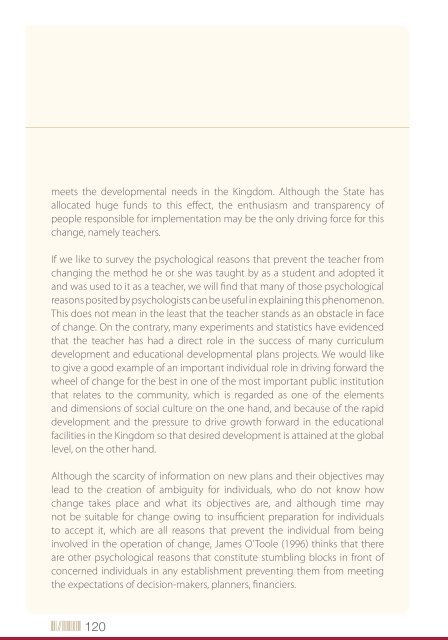General Supervisor
General Supervisor
General Supervisor
Create successful ePaper yourself
Turn your PDF publications into a flip-book with our unique Google optimized e-Paper software.
meets the developmental needs in the Kingdom. Although the State has<br />
allocated huge funds to this effect, the enthusiasm and transparency of<br />
people responsible for implementation may be the only driving force for this<br />
change, namely teachers.<br />
If we like to survey the psychological reasons that prevent the teacher from<br />
changing the method he or she was taught by as a student and adopted it<br />
and was used to it as a teacher, we will find that many of those psychological<br />
reasons posited by psychologists can be useful in explaining this phenomenon.<br />
This does not mean in the least that the teacher stands as an obstacle in face<br />
of change. On the contrary, many experiments and statistics have evidenced<br />
that the teacher has had a direct role in the success of many curriculum<br />
development and educational developmental plans projects. We would like<br />
to give a good example of an important individual role in driving forward the<br />
wheel of change for the best in one of the most important public institution<br />
that relates to the community, which is regarded as one of the elements<br />
and dimensions of social culture on the one hand, and because of the rapid<br />
development and the pressure to drive growth forward in the educational<br />
facilities in the Kingdom so that desired development is attained at the global<br />
level, on the other hand.<br />
Although the scarcity of information on new plans and their objectives may<br />
lead to the creation of ambiguity for individuals, who do not know how<br />
change takes place and what its objectives are, and although time may<br />
not be suitable for change owing to insufficient preparation for individuals<br />
to accept it, which are all reasons that prevent the individual from being<br />
involved in the operation of change, James O’Toole (1996) thinks that there<br />
are other psychological reasons that constitute stumbling blocks in front of<br />
concerned individuals in any establishment preventing them from meeting<br />
the expectations of decision-makers, planners, financiers.<br />
120<br />
Some people may think that change is not a normal state, and that things<br />
do not work so well, which gives them anxiety in face of expected change.<br />
Most people are contented with the way the institution works, i.e. they are<br />
happy about it and do not feel the need for change<br />
Those who adopt change may not give enough proof to evidence that<br />
change will benefit all individuals and the institution<br />
For some, change may look like a leap toward the unknown, which scares<br />
them<br />
Some individuals and groups may think that change will be beneficial to<br />
others but not to them.<br />
Some individuals in the institution may see grow in them the feeling that<br />
they are not up to the new challenges that they face, i.e. they lack selfconfidence<br />
in facing change.<br />
Some may think that change is useless, and that it is vain, artificial, and full<br />
of falsity.<br />
Some individuals do not acknowledge and believe in promises, and want<br />
immediate results. For them, change is based on futuristic promises, so<br />
they do not trust it<br />
Some groups adopt a negative attitude about change, so their members<br />
believe that satisfying the group is more important than change<br />
Some individuals see that change may succeed somewhere else but may<br />
not do so at home because our values are against change<br />
121


